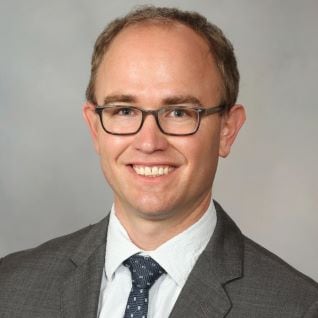/prod01/channel_2/media/mccms/content-assets/academics/residencies-and-fellowships/cardiovascular-pathology-fellowship-minnesota/meet-our-trainees/Schultz-Matthew-16369271-202109071038.jpg)
Matthew Schultz, Ph.D.
Program Director
Assistant Professor of Laboratory Medicine & Pathology
Consultant in Laboratory Genetics & Genomics
/prod01/channel_2/media/mccms/content-assets/academics/residencies-and-fellowships/cardiovascular-pathology-fellowship-minnesota/meet-our-trainees/CLBG-Meet-the-Faculty-1024X512-1601690-3858921-0016.jpg)
The Department of Laboratory Medicine and Pathology at Mayo Clinic's campus in Rochester, Minnesota, is one of the world's largest and most sophisticated clinical laboratory and pathology departments. The department performs more than 20 million laboratory tests annually in support of the Mayo Clinic practice and more than 4,000 Mayo Clinic Laboratories clients around the world.
More than 500,000 laboratory tests are performed annually in the Biochemical Genetics Laboratory using more than 150 procedures. Close collaboration with the clinical departments at Mayo Clinic and in particular the Department of Medical Genetics allows you to assess laboratory findings in light of the complete clinical context.
The Division of Laboratory Genetics was established in 1992 with Cytogenetics, Molecular Genetics and Fertility Testing laboratories, adding the Biochemical Genetics Laboratory in 1996 and the Clinical Genome Sequencing Laboratory in 2014.
In January 2017, the Cytogenetics Laboratory and Molecular Genetics Laboratory combined to form one laboratory now known as the Genomics Laboratory. To reflect this change, the Division of Laboratory Genetics has been renamed the Division of Laboratory Genetics and Genomics.
Since its formation, the division has actively contributed to the study of genetic disease and the advancement of genetic testing and related technology. This effort is ultimately aimed at enhancing clinical patient care. Within each laboratory, board-certified directors and genetic counselors work closely with laboratory supervisors and technologists to ensure that accurate, reliable results are available in a timely manner.
In addition to caring for patients in clinical practice, Mayo Clinic's faculty is committed to teaching and facilitating the growth of medical knowledge. Many faculty members have published and lectured extensively and are highly regarded in their fields.
You have direct access to the laboratory medicine and pathology faculty members throughout the Clinical Biochemical Genetics Fellowship.
You are assigned a dedicated faculty adviser who can provide comprehensive educational advice and personal support. You meet with your adviser periodically throughout the program to review your progress and career goals, and ensure that your educational needs are being met. Your adviser also serves as a contact point for introducing you and your family to Rochester, Minnesota, and the Mayo Clinic system.
Many prominent professors visit Mayo Clinic each year. They present their work during lectures, participate in hospital rounds and have informal discussions with trainees. You are encouraged to take full advantage of these educational opportunities.
 Welcome to the Mayo Clinic Clinical Biochemical Genetics Fellowship. My own training in this program was a pivotal point in my career, equipping me with both the technical skills and clinical insight needed to serve patients with rare and complex metabolic disorders. It’s a privilege to now serve as the fellowship director and contribute to the same environment of academic rigor, collegiality, and patient-centered care that shaped my own professional development.
Welcome to the Mayo Clinic Clinical Biochemical Genetics Fellowship. My own training in this program was a pivotal point in my career, equipping me with both the technical skills and clinical insight needed to serve patients with rare and complex metabolic disorders. It’s a privilege to now serve as the fellowship director and contribute to the same environment of academic rigor, collegiality, and patient-centered care that shaped my own professional development.
This program is deeply embedded in Mayo Clinic’s longstanding commitment to excellence in education. Fellows work closely with faculty and staff across laboratory gaining broad exposure to inherited metabolic disease ranging from newborn screening to adult onset conditions. Our structured curriculum emphasizes critical thinking, case-based learning, test development, and laboratory management preparing fellows for a career in laboratory biochemical genetics.
What makes this program truly exceptional is not only the depth of our clinical volume and the resources available, but also the culture. Mayo’s model of integrated, team-based care ensures that trainees learn experts across disciplines who value education as a core mission. Our goal is to prepare clinical biochemical geneticists who are prepared to excel in their life pursuits. I look forward to welcoming upcoming fellows to our laboratory. Please reach out to me if you have any questions about our program!
Matthew Schultz, Ph.D.
Program Director